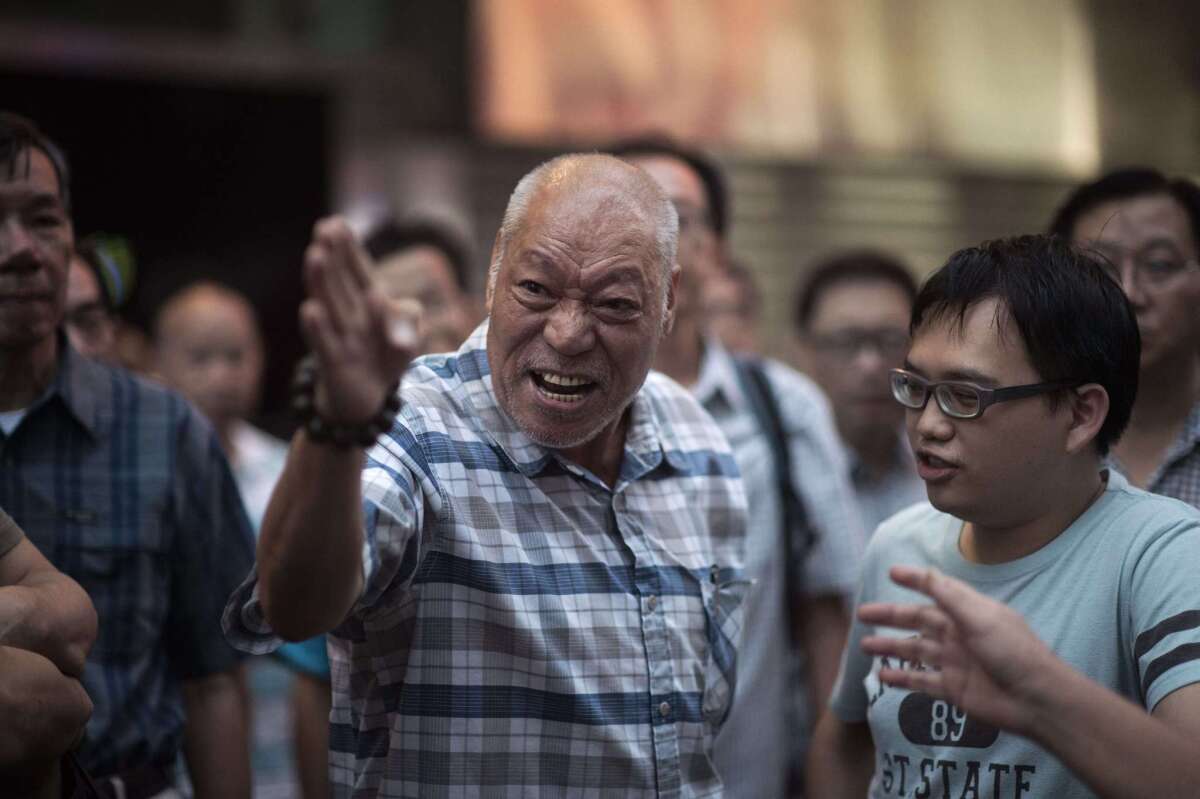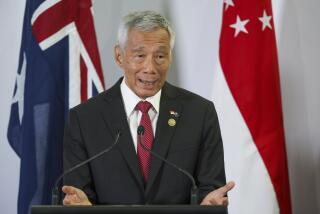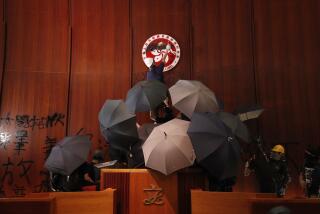Hong Kong chief faces new calls to step down as protests continue

A key pro-establishment Hong Kong politician on Friday urged the territory’s chief executive to step down, saying people had lost their trust in the government and a failure to resign would only exacerbate societal divisions.
With democracy protests having paralyzed parts of the city for nearly a month, the call by Liberal Party leader James Tien marked the first time that a pro-Beijing lawmaker has thrown his weight behind calls by the Pan-Democratic camp urging Chief Executive Leung Chun-ying to step aside.
Tien said Hong Kong was on the verge of being ungovernable and warned that the city’s international reputation would deteriorate further if Leung remained in office. He added that many of Hong Kong’s problems have little to do with the Occupy Central pro-democracy campaign but instead are deeply rooted in the administration’s inability to govern.
Tien’s remarks came as Hong Kong’s retired first chief executive, Tung Chee-hwa, urged the protest leaders to resume dialogue with the government.
He said the harm the movement was doing to the territory was “far more serious than anyone could imagine” but stated firmly that military force from Beijing will not be used to disperse the demonstrators. Hong Kong’s police force, he said, is capable of handling the situation.
The Hong Kong Federation of Students, one of the lead protest groups, said Friday it would ask protesters in the Admiralty district whether they should end the sit-ins and accept some vague proposals put forth by the government this week. The poll is to be held on Sunday.
Demonstrators in Hong Kong, a former British territory that returned to Chinese rule in 1997 under a framework known as “one country, two systems,” have taken to the streets to demand open nominations of candidates for the chief executive election in 2017. But China’s central government in Beijing has rejected such a framework, insisting that all candidates be approved by a special committee.
Five government officials faced off in an open dialogue with student leaders Tuesday for the first talks to end the political crisis, a meeting that appeared to yield few results.
Tung served as chief executive from 1997 to 2005 and resigned under pressure. It was his second news conference in recent weeks on Hong Kong’s political situation. Tung, who is vice chairman of the Chinese People’s Political Consultative Conference, is been widely regarded as a proxy voice of Beijing.
Tung said the ongoing sit-ins had damaged Hong Kong’s economy and affected the livelihoods of millions in the territory of 7 million.
The former shipping tycoon said he understood that bookings at local hotels had fallen by 20% to 30% in recent weeks and credit-card spending had seen a similar drop. He warned that the uncertainty arising from the Occupy Central movement might prompt foreign companies to reconsider plans to set up offices or make investments in Hong Kong.
“This is not just a number, it means millions of occupations at risk,” Tung said.
He also condemned the movement for undermining the rule of law and “seriously impacting” the relationship with mainland China.
Tung said he could feel the dissatisfaction among the protesters and agreed with them that elections in Hong Kong should be more democratic. But he insisted that civil nominations -- an open-style nominations system that protesters have called for -- is not the only way for true democracy.
Under a decision by the standing committee of the National People’s Congress in Beijing, candidates for Hong Kong’s chief executive election in 2017 are to be vetted by a nominating committee widely expected to be stacked with pro-establishment figures. Tung said, however, that the composition of the committee could be discussed and altered.
“The National People Congress’ framework for the 2017 political election is nonnegotiable,” said Tung. “We must focus now on the next stage of consultation on nominating committee makeup. There are still a lot things we can do to improve it.”
Tung urged student protest leaders to continue talks with the government officials, saying that the chances of achieving a more democratic system were high if students keep negotiating without setting preconditions.
Protesters in the Mong Kok neighborhood were unimpressed by Tung’s appeal.
“We will not leave until the government make a big concession,” said Jennifer Lee, a 22-year-old student. “Hong Kong people want true democracy, but the government is just using time-wasting tactics.”
“I don’t really know much about … civil nomination, but I am staying to support the students,” said Choi Chi Yin, a 59-year-old worker. “If there is still a student here, I will stay.”
Hui is a special correspondent. Times staff writer Julie Makinen in Beijing contributed to this report.
Follow @JulieMakLAT on Twitter for news out of Asia
More to Read
Start your day right
Sign up for Essential California for news, features and recommendations from the L.A. Times and beyond in your inbox six days a week.
You may occasionally receive promotional content from the Los Angeles Times.






